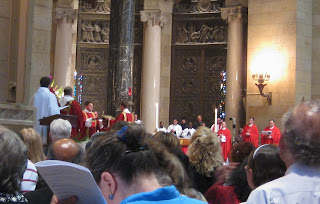(Caritas in Veritate in 10 minutes or less)
Having finished Caritas in Veritate (setting a new personal record for encyclical-reading, thanks for asking), my first impression is that it covers a lot of ground. Under the umbrella of putting the Truth back in our Charity, Pope Benedict touches on environmentalism, terrorism, globalization, labor outsourcing, the Mexico City Policy (not by name, but pretty clearly, nonetheless), and even international tourism. Rather than consisting solely of general reflections and teaching on the balance of truth and charity (which is mainly what I expected to find), the encyclical jumps around to numerous specific social issues of our time, tracing them back to a lack of truth in our charity.
All of the issues mentioned are discussed in the light of "development", which is the name of the game here (the word is used 247 times in 43 pages). Some of the other often-used phrases include "globalization" (27 times), "(economic) crisis" (15 times), welfare (11 times), and the "dignity of persons/the individual/the worker/work" (10 times).
One of the themes of this writing is the need for the supernatural in human life. The "perspective of eternal life", as Benedict calls it, is what makes man aspire to something beyond material wealth. "Humanity," he writes, "thus loses the courage to be at the service of higher goods." (11) He assures us that "Man is not a lost atom in a random universe; he is God's creature, whom God chose to endow with an immortal soul and whom he has always loved." (29) He also expresses the need for God in public life, writing that "practical atheism", promoted by the State, "deprives its citizens of the moral and spiritual strength that is indispensible for attaining integral human development..." (29) Finally, he addresses the need for the supernatural in the realm of science, writing that when the scientist rules out the possibility of transcendence, he does not solve his problems. Rather, he finds himself only with more, deeper questions. (74) He encourages us not to attempt to explain everything based on reason, instead telling us, "In every truth there is something more than we would have expected, in the love that we receive there is always an element that surprises us. We should never cease to marvel at these things." (77 -emphasis mine)
Pope Benedict also mentions our old friends Faith and Reason, as well as mentioning the Church's relevance and place in the modern world. Rather than contributing to the scientific or political advances of the world, she rather is concerned with helping society through "examin[ing] the signs of the times and interpret[ing] them", and sharing the truth. (9, 18) Faith and reason, as has been written and said so many times before, enrich one another and are mutually necessary: "Reason always stands in need of being purified by faith: this also holds true for political reason, which must not consider itself omnipotent. For its part, religion always needs to be purified by reason in order to show its authentically human face." (56)
One of the Pope's favorite themes gets brief mention, too, when he mentions that there is not a rupture between the pre- and -postconciliar social teachings of the Church. "On the contrary," he writes, "there is a single teaching, consistent and at the the same time ever new....Coherence does not mean a closed system: on the contrary, it means dynamic faithfulness to a light received." (12)
And now, in case you're wondering what the Pope did in fact have to say about the social issues of our time, here's (quite) a few soundbites. I've tried mightily not to take them out of context.
Globalization: "The risk for our time is that the de facto interdependence of people and nations is not matched by ethical interaction of consciences and minds that would give rise to truly human development." (9)
False Messianism: "The 'types of messianism which give promises but create illusions' (PP, 11) always build their case on a denial of the transcendent dimension of development, in the conviction that it lies entirely at their disposal." (17) I don't know about you, but I definitely thought of this guy.
Outsourcing and Social Security: "The market has prompted new forms of competition between States as they seek to attract foreign businesses to set up production centres....These processes have led to a downsizing of social security systems as the price to be paid for seeking greater competitive advantage in the global market, with consequent grave danger for the rights of workers, for fundamental human rights and for the solidarity associated with the traditional forms of the social State." (25)
Unions: "Through the combination of social and economic change, trade union organizations experience greater difficulty in carrying out their task of representing the interests of workers, partly because Governments, for reasons of economic utility, often limit the freedom or the negotiating capacity of labour unions. Hence traditional networks of solidarity have more and more obstacles to overcome. The repeated calls issued within the Church's social doctrine, beginning with Rerum Novarum, for the promotion of workers' associations that can defend their rights must therefore be honoured today even more than in the past." (25)
Welfare: "Being out of work or dependent on public or private assistance for a prolonged period undermines the freedom and creativity of the person and his family and social relationships, causing great psychological and spiritual suffering. I would like to remind everyone, especially governments engaged in boosting the world's economic and social assets, that the primary capital to be safeguarded and valued is man, the human person in his or her integrity: “Man is the source, the focus and the aim of all economic and social life'." (25)
Abortion Policies/Promotion: "In economically developed countries, legislation contrary to life is very widespread, and it has already shaped moral attitudes and praxis, contributing to the spread of an anti-birth mentality; frequent attempts are made to export this mentality to other States as if it were a form of cultural progress.
Some non-governmental Organizations work actively to spread abortion, at times promoting the practice of sterilization in poor countries, in some cases not even informing the women concerned. Moreover, there is reason to suspect that development aid is sometimes linked to specific health-care policies which de facto involve the imposition of strong birth control measures. Further grounds for concern are laws permitting euthanasia as well as pressure from lobby groups, nationally and internationally, in favour of its juridical recognition." (28)
The Market: "Economy and finance, as instruments, can be used badly when those at the helm are motivated by purely selfish ends. Instruments that are good in themselves can thereby be transformed into harmful ones. But it is man's darkened reason that produces these consequences, not the instrument per se. Therefore it is not the instrument that must be called to account, but individuals, their moral conscience and their personal and social responsibility." (36)
Population Control: "To consider population increase as the primary cause of underdevelopment is mistaken, even from an economic point of view...nor can sex education be reduced to technical instruction aimed solely at protecting the interested parties from possible disease or the “risk” of procreation. This would be to impoverish and disregard the deeper meaning of sexuality, a meaning which needs to be acknowledged and responsibly appropriated not only by individuals but also by the community. It is irresponsible to view sexuality merely as a source of pleasure, and likewise to regulate it through strategies of mandatory birth control....Against such policies, there is a need to defend the primary competence of the family in the area of sexuality, as opposed to the State and its restrictive policies, and to ensure that parents are suitably prepared to undertake their responsibilities." (44)
The Environment: "When nature, including the human being, is viewed as the result of mere chance or evolutionary determinism, our sense of responsibility wanes. In nature, the believer recognizes the wonderful result of God's creative activity, which we may use responsibly to satisfy our legitimate needs, material or otherwise, while respecting the intrinsic balance of creation. If this vision is lost, we end up either considering nature an untouchable taboo or, on the contrary, abusing it." (48)
Alternative Energy: "The technologically advanced societies can and must lower their domestic energy consumption, either through an evolution in manufacturing methods or through greater ecological sensitivity among their citizens. It should be added that at present it is possible to achieve improved energy efficiency while at the same time encouraging research into alternative forms of energy. What is also needed, though, is a worldwide redistribution of energy resources, so that countries lacking those resources can have access to them." (49)
The Connection of "Life Issues" to Environmentalism: "If there is a lack of respect for the right to life and to a natural death, if human conception, gestation and birth are made artificial, if human embryos are sacrificed to research, the conscience of society ends up losing the concept of human ecology and, along with it, that of environmental ecology. It is contradictory to insist that future generations respect the natural environment when our educational systems and laws do not help them to respect themselves." (51)
Consumerism: "It is good for people to realize that purchasing is always a moral — and not simply economic — act." (66)
The U.N.: (I'm just including the whole paragraph, since I'm not sure I entirely grasp what he's getting at here. Someone who knows more is more than welcome to enlighten me.) "In the face of the unrelenting growth of global interdependence, there is a strongly felt need, even in the midst of a global recession, for a reform of the United Nations Organization, and likewise of economic institutions and international finance, so that the concept of the family of nations can acquire real teeth. One also senses the urgent need to find innovative ways of implementing the principle of the responsibility to protect and of giving poorer nations an effective voice in shared decision-making. This seems necessary in order to arrive at a political, juridical and economic order which can increase and give direction to international cooperation for the development of all peoples in solidarity. To manage the global economy; to revive economies hit by the crisis; to avoid any deterioration of the present crisis and the greater imbalances that would result; to bring about integral and timely disarmament, food security and peace; to guarantee the protection of the environment and to regulate migration: for all this, there is urgent need of a true world political authority, as my predecessor Blessed John XXIII indicated some years ago. Such an authority would need to be regulated by law, to observe consistently the principles of subsidiarity and solidarity, to seek to establish the common good, and to make a commitment to securing authentic integral human development inspired by the values of charity in truth. Furthermore, such an authority would need to be universally recognized and to be vested with the effective power to ensure security for all, regard for justice, and respect for rights. Obviously it would have to have the authority to ensure compliance with its decisions from all parties, and also with the coordinated measures adopted in various international forums. Without this, despite the great progress accomplished in various sectors, international law would risk being conditioned by the balance of power among the strongest nations. The integral development of peoples and international cooperation require the establishment of a greater degree of international ordering, marked by subsidiarity, for the management of globalization. They also require the construction of a social order that at last conforms to the moral order, to the interconnection between moral and social spheres, and to the link between politics and the economic and civil spheres, as envisaged by the Charter of the United Nations." (67)
The Media (sorta): "What is astonishing is the arbitrary and selective determination of what to put forward today as worthy of respect. Insignificant matters are considered shocking, yet unprecedented injustices seem to be widely tolerated." (75)
























